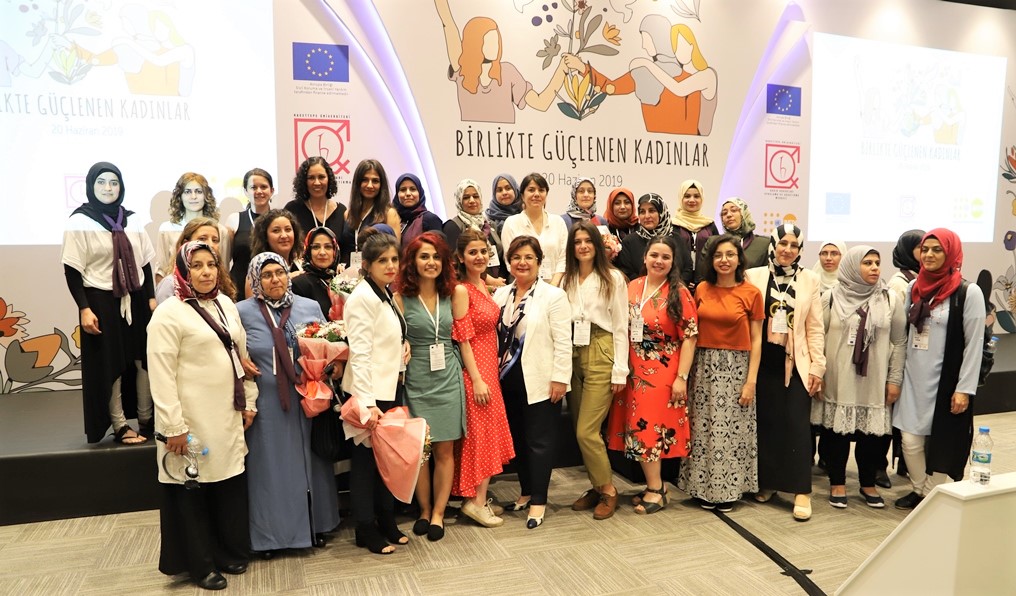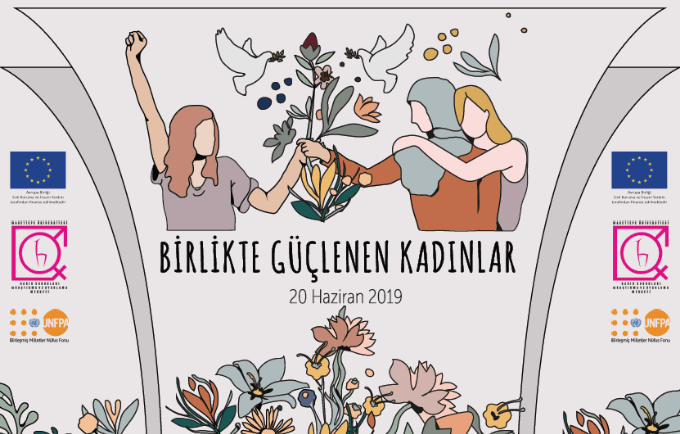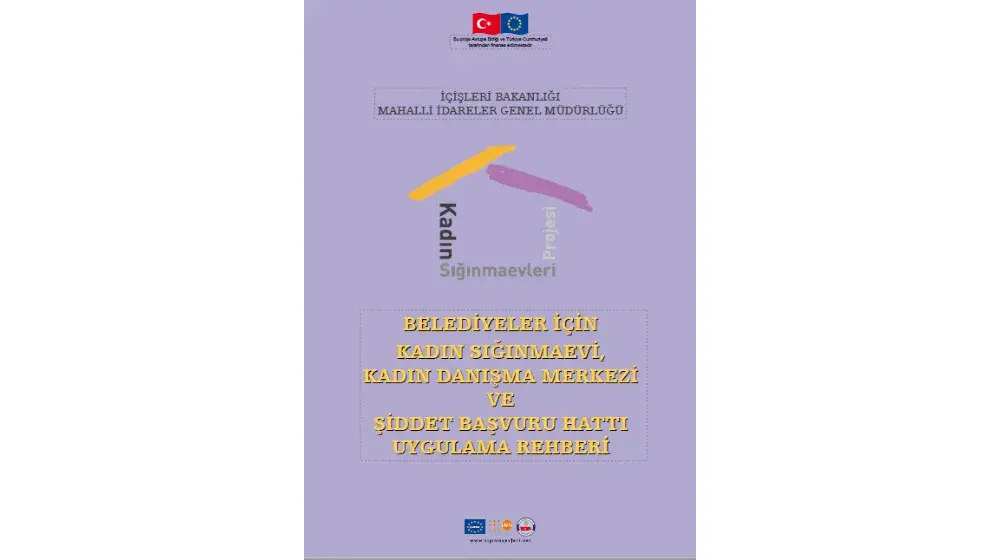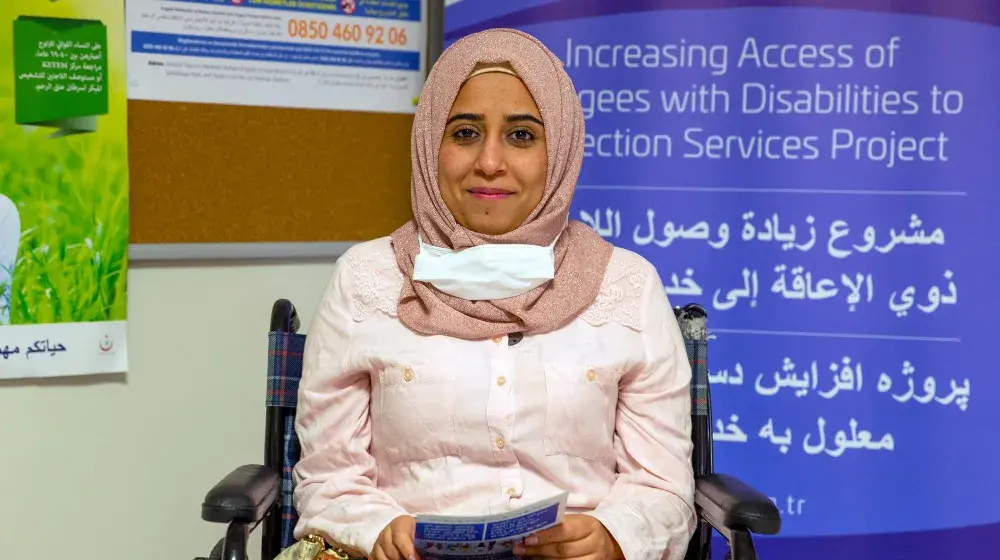20 Haziran 2019, Ankara - Dünya Mülteciler Günü, UNFPA, Birleşmiş Milletler Nüfus Fonu İnsani Yardım Programı’nın yürütücü ortaklarından olan Hacettepe Üniversitesi Kadın Sorunları Uygulama ve Araştırma Merkezi (HÜKSAM) tarafından birinci basamakta sağlık hizmetini geçici koruma statüsündeki Suriyelilere ulaştıran Kadın Sağlığı Danışma Merkezi’nin yararlanıcı Suriyeli kadınlarıyla birilikte kutlandı.
“Birlikte Güçlenen Kadınlar” başlıklı etkinlik, hem Kadın Sağlığı Danışma Merkezi’nin sunduğu sağlık ve psiko-sosyal danışmanlık hizmetleriyle kadınların hayatındaki olumlu değişikliğe hem de merkezin hizmet verdiği süre içinde yapılan akademik araştırmaların sonuçlarının davetlilerle paylaşılmasına imkan verdi.
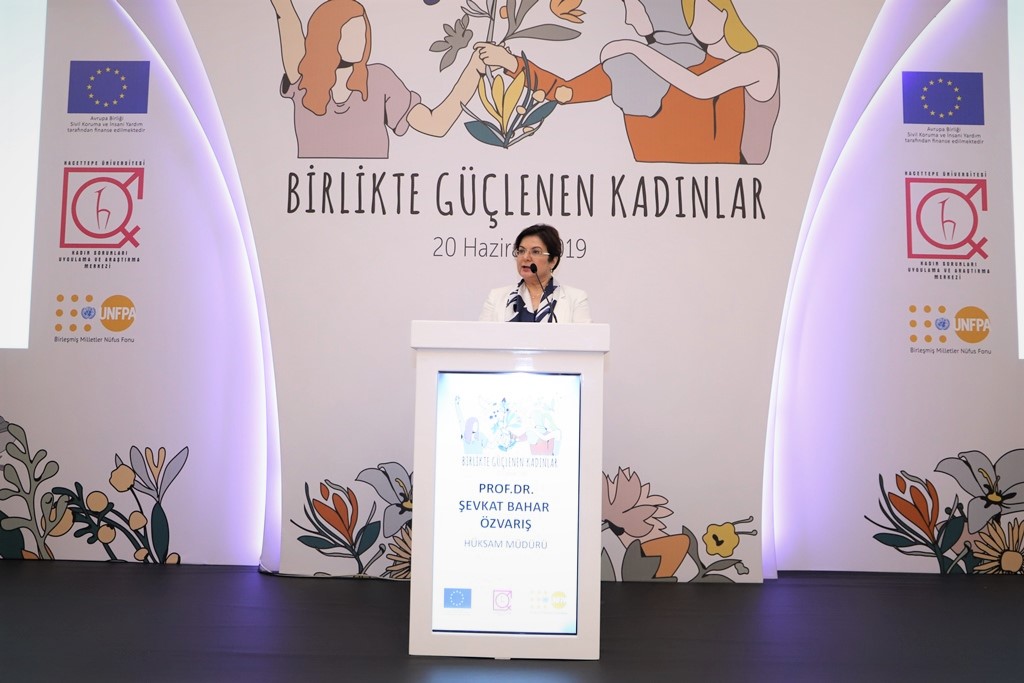
HÜKSAM Müdürü Prof. Dr. Şevkat Bahar-Özvarış, “Birlikte Güçlenen Kadınlar” etkinliğinin açılış konuşmasını yaparken 50 yıllık döneme bakıldığında dünyada göçmen sayısının 3 kat arttığını ve göç sorunun bir insan hakları sorunu olduğunu da vurguladı. Zorunlu göçün neden olduğu sorunlara çözüm sunmak adına Ankara’da nüfusu 90 bini aşan geçici koruma altındaki Suriyeli nüfus içerisindeki kadın ve kız çocuklarına yönelik 2015 yılından günümüze Avrupa Birliği Sivil Koruma ve İnsani Yardım Operasyonları’nın (ECHO) finansal katkıları, UNFPA, Birleşmiş Milletler Nüfus Fonu’nun teknik desteğiyle ve Ankara İl Sağlık Müdürlüğü Halk Sağlığı Hizmetleri Başkanlığı bünyesinde hizmet veren Göçmen Sağlığı Merkezleri içerisindeki güvenli alanların oluşturulması ve hizmet sunulması konusunda yapılan çalışmalara değindi. Prof. Dr. Şevkat Bahar-Özvarış, Ankara’da üç adet Kadın Sağlığı Danışma Merkezi’nde, cinsel sağlık ve üreme sağlığı, toplumsal cinsiyete dayalı şiddetle mücadele ile kadın ve kız çocuklarını güçlendirmeye yönelik çalışmaların 23’ü Suriyeli ve Iraklı olmak üzere toplam 34 kadın çalışanla yapılmakta olduğunu aktardı. Bu merkezlerde dört yıldır hizmet sunarken aynı zamanda, bir üniversite birimi olmaları nedeniyle konu ile ilgili çeşitli bilimsel çalışmalar yaparak kanıta dayalı veri ürettiklerini, üretilen bilgiyi kamu, akademik çevreler, sivil toplum örgütleri ve uluslararası kuruluşlar ile paylaştıklarını belirtti.
Halk Sağlığı Hizmetleri Başkan Yardımcısı Dr. Çiğdem Şimşek, yaptığı konuşmada Türkiye’nin 3.7 milyon sığınmacaya kuçak açarak dünyada en yüksek sayıda göçmene ev sahipliği yaptığını söyleyerek konuşmasına başladı. Ankara’da bulunan geçici koruma altındaki Suriyeliye sağlık hizmeti ulaştırmak için HÜKSAM’la imzalanan protokol sonrasında ilk merkezin Ulubey’de açılmasına değinen Dr. Şimşek, aynı merkezin Alemdağa taşınmasıyla çok daha kapsamlı sağlık hizmeti vermeye başladığını iletti. Dr. Şimşek, sahadaki çalışmalarında HÜKSAM’ın hem göçmenlere hem de Türk kadınlarına hizmet vermek için önemli çalışmalar yaptığını da vurguladı.
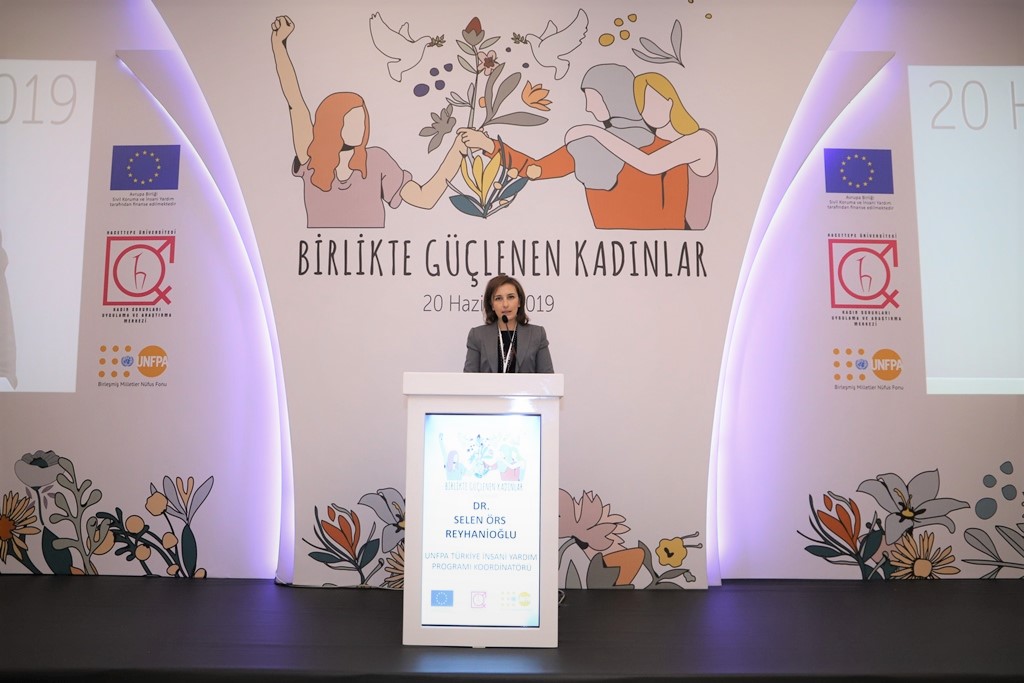
UNFPA, Birleşmiş Milletler Nüfus Fonu İnsani Yardım Program Koordinatörü Dr. Selen Örs Reyhanioğlu, UNFPA’nin 50 yıldır anne ve çocuk sağlığı, üreme sağlığı ve hakları, toplumsal cinsiyet eşitliğinin sağlanması, kadına yönelik şiddetle mücadele, kalkınma ile ilgili verilerin üretimi ile birlikte gençlerin güçlenmesi ve potansiyellerini kullandığı bir dünya için çalışmakta olduğunu belirtti. 2011 yılında başlayan Suriye krizinin ardından Türkiye’de toplam 35 adet Kadın Sağlığı Danışma Merkezi ile geçici koruma altındaki Suriyeli kadın ve kız çocuğuna sağlık ve psiko-sosyal danışmak hizmetlerini ulaştırmak için insani yardım programını yönettiklerine de ekledi. Düzenlenen etkinlikle, insani yardım çalışmalarının olumlu yansımalarının paylaşılacağını da söyledi. Konuşmasında Rakka’dan gelen bir mültecinin anlattıklarını paylaşarak tamamladı. Suriyeli bir yararlanıcı HÜKSAM’ın yürüttüğü merkezlerden birini kastederek; “Çok şey öğrendim buradan. Güçlü hissediyorum. Çok güçlü bir kişiliğimin olduğunu düşünüyorum. Onun dışında medeni hukuku öğrendim. Şunların, hiçbirini bilmiyordum mesela bir kadının hakları olduğunu, 18 yaşından küçükse evlenemeyeceğini, şiddetin yasak olduğunu bilmiyordum. Üreme sağlığı ve kadın sağlığı ile ilgili çok şey öğrendim” dedi.
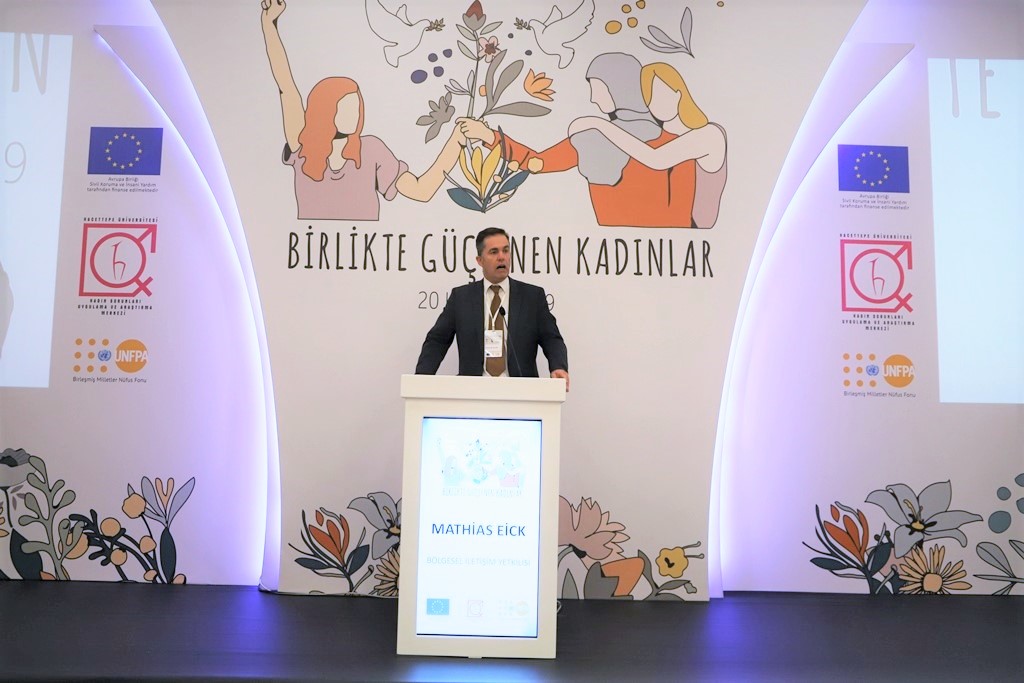
Avrupa Birliği Sivil Koruma ve İnsani Yardım Operasyonları (ECHO), Bölgesel İletişim Yetkilisi Mathias Eick de “Birlikte Güçlenen Kadınlar” etkinliği açılışında bir konuşma yaptı. Konuşmasında, Türkiye’nin en yüksek sayıda mülteciye ev sahipliği yaptığına vurgu yapan Eick, Suriye’den gelen çatışma haberlerinin halen bu grubun çatışmalardan en çok etkilenen grup olduğunu gösterdiğini söyledi. Savaştan kaçanlara evlerini ve kalplerini açan Türkiye sayesinde Suriyeli kadın ve kız çocukları güvenli alanlara ulaşabiliyor yorumunu yapan Eick, UNFPA, diğer sivil toplum kuruluşları ve Sağlık Bakanlığı’nın koordineli çalışmaları sayesinde mülteci krizinin neden olduğu sorunlara destek olmak için başarılı çalışmalar yapılıyor, dedi. Krizden etkilenenlere ulaşmanın koordineli çalışma gerektirdiğine vurgu yapan Eick, bu gibi kurumların ortaklıkları sayesinde Suriyeli kadınlar sağlık hizmetlerine ulaşabiliyor dedi. Konuşmasında kendisinin Kadın Sağlığı Danışma Merkezlerini ziyareti sırasındaki gözlemlerini de paylaşan Eick, “Merkezlerde tanıştığım yararlanıcı kadınların dönüşümü beni çok etkiledi. Yardım almaya gelen kadınlar bir süre sonra bu yardımlara katkı sunabilen merkez çalışanlarına dönüşüyor. Bu etkileyici başarı, sizlerin yaptığı önemli çalışmaların ürünüdür” dedi.
“Birlikte Güçlenen Kadınlar” etkinliğinde Hacettepe Üniversitesi Rektör Yardımcısı Prof. Dr. Burçin Şener de yaptığı açılış konuşmasında, Suriye krizinden en çok zarar gören grubun kadınlar ve kız çocuklar olduğuna dikkat çekti. Yaşanan sorunları aşmak için toplumda bir dönüşüm yapılması gerektiğini söyleyen Prof. Dr. Şener, üniversitelerin söz konusu dönüşümün sağlanması için yapılan bilimsel çalışmalarla sürece liderlik ettiğini ekledi.
Etkinlik, Kadın Sağlığı Danışma Merkezi’nin hizmeti süresince tamamlanan akademik çalışmaların çıktılarının sunumlarıyla devam etti. Sırasıyla, Kadın Sağlığı Danışma Merkezlerine Başvuran Suriyeli Kadınların Üreme Sağlığı ve Toplumsal Cinsiyete Dayalı Şiddet Hizmetlerine İlişkin İhtiyaçlarının Belirlenmesi Araştırması, Kültürlerarası Duyarlılık ve Birlikte Yaşam Araştırması Sonuçları, Suriye’den Türkiye’ye Uzanan Yolda Kadın Olmak başlıklı sunumlar davetlilerle paylaşıldı.
Hacettepe Üniversitesi, Nüfus Etütleri Enstitüsü’nden Doç.Dr. İlknur Yüksel-Kaptanoğlu, Prof. Dr. Şevkat Bahar-Özvarış, Uzm. Psk. Türküler Erdost ve Öğr. Gör. Hande Konşuk-Ünlü tarafından Ağustos – Eylül 2017 tarihinde yapılan “Kadın Sağlığı Danışma Merkezlerine Başvuran Suriyeli Kadınların Üreme Sağlığı ve Toplumsal Cinsiyete Dayalı Şiddet Hizmetlerine İlişkin İhtiyaçlarının Belirlenmesi Araştırması” başlıklı araştırmayı sunarken bu araştırmada 413 Suriyeli kadın ile yüz yüze görüşmeler yapılarak bilgi toplandındığını belirtti. UNFPA, Birleşmiş Milletler Nüfus Fonu’nun Hacettepe Üniversitesi Kadın Sorunları Uygulama ve Araştırma Merkezi (HÜKSAM) yürütücü ortaklığında sağlık hizmeti verdiği Kadın Sağlığı Danışma Merkezini kullanan Suriyeli kadınların hepsi Suriye’de yaşanan çatışmalardan direkt olarak etkilendiği ortaya çıkıyor.

Aynı araştırma sonuçlarına bakıldığında, erkeklerin eşlerine yönelik travma temelli psikolojik, fiziksel ve cinsel şiddet gösterme eğilimi bulgularla destekleniyor.
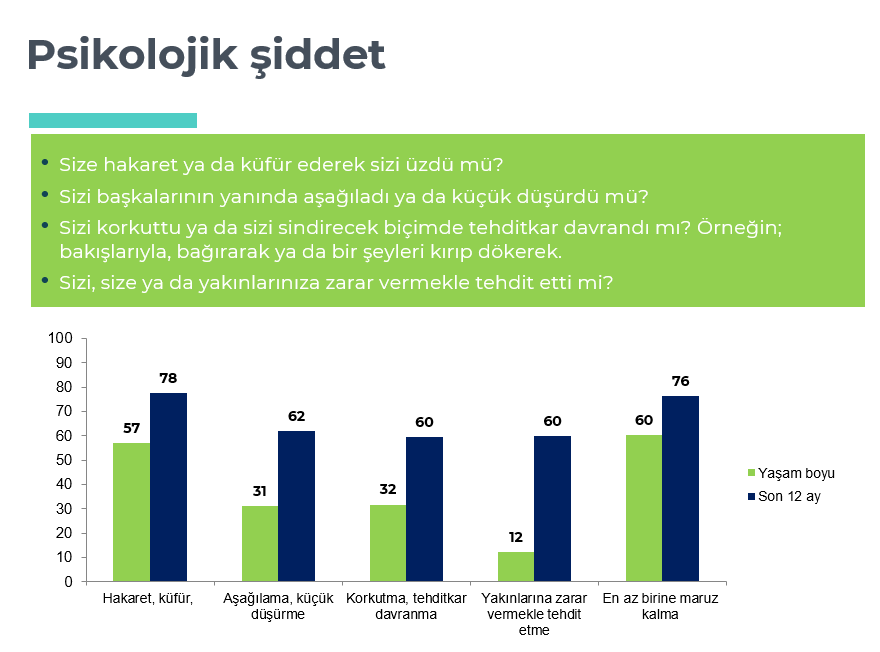
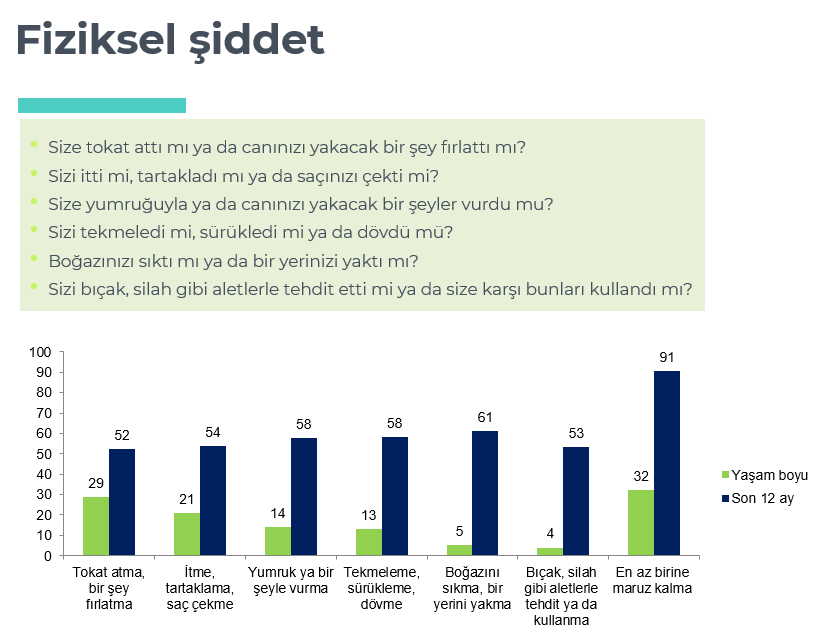
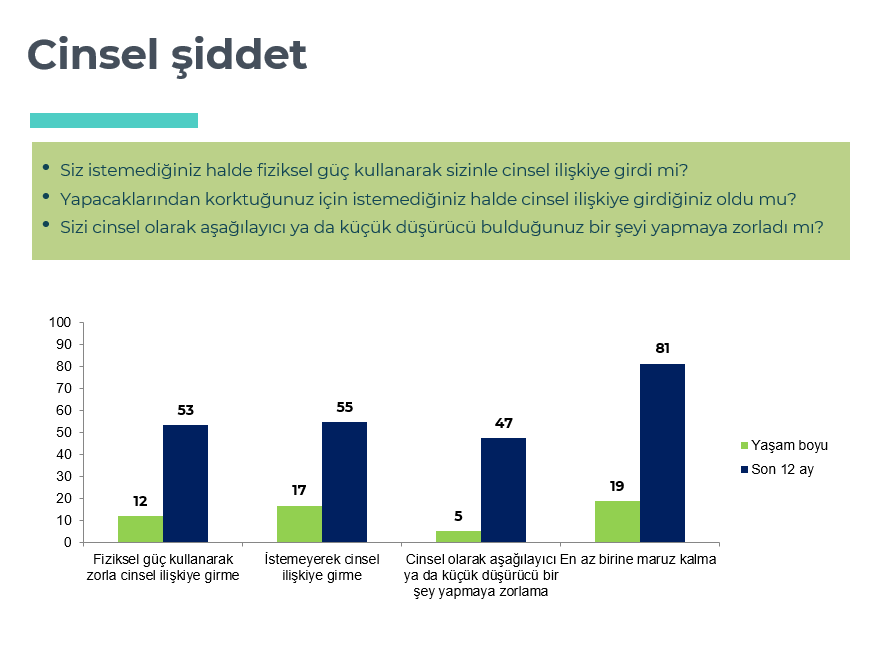
TED Üniversitesi Sosyoloji Bölümü, Bölüm Başkanı Prof. Dr. Kezban Çelik, hizmet sunduğu bölgelerde bölge halkı ve göçmenler arasında yaşanan bazı sorunları daha iyi anlamak için HÜKSAM’ın talebi üzerine 2017 yılında “Kültürlerarası Duyarlılık ve Birlikte Yaşam Araştırması”nı yaptıklarını belirtmiştir. Odak grup görüşmeleriyle yapılan araştırma sonuçlarına ilişkin sunumunda, Kadın Sağlığı Danışma Merkezlerinde uygulanan “sağlık aracısı” modelinin, Suriyeli nüfus üzerinde dönüştürücü bir etkisi olduğunu söyleyen Prof. Dr. Çelik, sağlık aracısı çalışanlarının merkez ve Suriyelilerin yoğun olarak yaşadığı mahalleler arasında bir köprü görevini üstlendiğini iletti. Kadın Sağlığı Danışma Merkezlerinin, sundukları sağlık hizmetine ek olarak, Suriyeli kadınların evlerinden çıkıp, sosyal hayata dahil olabilmelerine de imkan sunduğunu iletti. Yapılan araştımada, Suriyeli kadınlar için çocuklarının eğitim ve sosyal hayatının durumu en kaygı verici durum olduğunu, çocuklarının okula gitmesi, diğer çocuklar tarafından dışlanmaması Suriyeli annelerin en büyük dileklerinden olduğunu belirtmiştir.
Hacettepe Üniversitesi Sosyal Hizmet Bölümü öğretim üyesi ve HÜKSAM Yönetim Kurulu üyesi Prof. Dr. Özlem Cankurtaran’ın, Arş. Gör. Hande Albayrak ile “Suriye’den Türkiye’ye Uzanan Yolda Kadın Olmak” başlıklı sunumunda, 26 Suriyeli kadın ile yüz yüze yaptıkları derinlemesine görüşmeler sonunda, Kadın Sağlığı Danışma Merkezinin sunduğu sağlık hizmetleriyle, kadınlarda hem sağlık hem de hakları konusunda belirgin bir bilinçlenme artışının olduğu tespit edilmiş olduğunu belirtildi. Kız çocuklarının okulu bırakmalarının, ve evde aldıkları sorumluluklar nedeniyle sanki o kız çocuklarının yetişkinmiş gibi bir anlayış oluşmasına neden olduğuna vurgu yapan Prof. Dr. Cankurtaran, özellikle Suriyeli kız çocuklarının okulda kalmasının çok önemli olduğunu söyledi.
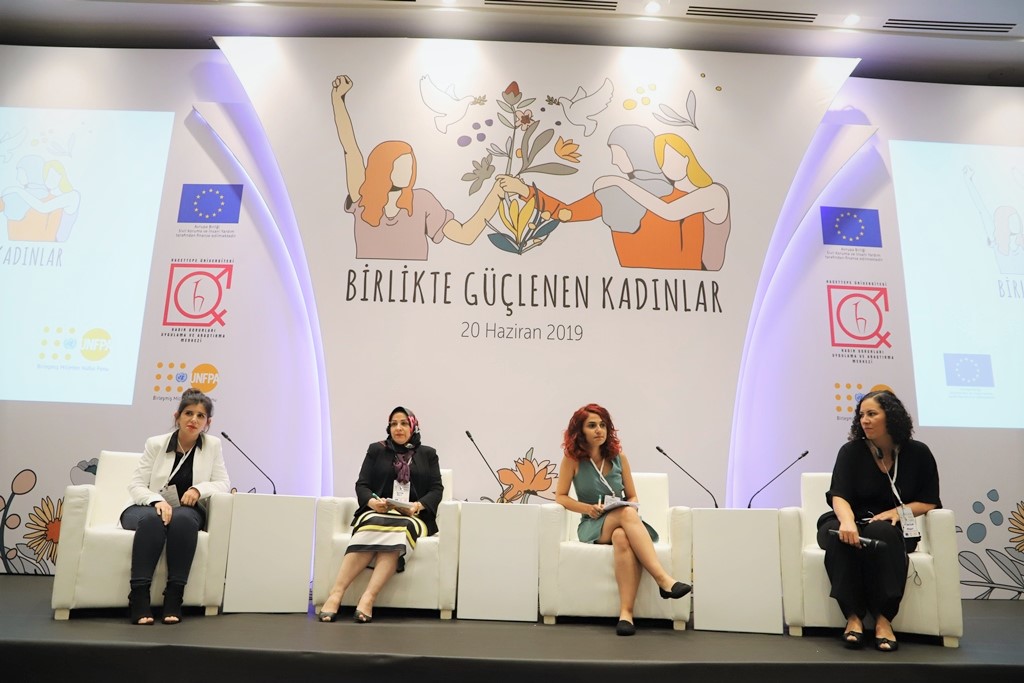
Etkinliğin son aktivitesi, Kadın Sağlığı Danışma Merkezlerinde görev yapan Suriyeli, Iraklı ve Türkiyeli çalışanların gözlemlerini paylaştığı bir panel oldu. HÜKSAM’da Uzman Psikolog olarak görev yapan Türküler Erdost, paneldeki konuşmasında “Biz bu yaptıklarımızı proje olarak görmüyoruz, tüm yaptıklarımızı yaşıyoruz. Bugün sizlerin de bizlerin yaşadıklarını görmenizi istiyoruz” dedi. Merkezde psikolog olarak hizmet veren Ebru Kondakçı, sadece savaş sonrası travma konusunda vakalara hizmet vermediğini, aynı zamanda toplumsal cinsiyet eşitsizliği konusunda da yoğun olarak hizmet sunduğunu söyledi. Travmanın çatışmaların sürmesi nedeniyle devam etmesinden dolayı, travma sonrası psikolojik tedavi vermenin mümkün olmadığını söyledi; akrabalarını, sevdiklerini hala kaybetmeye devam eden insanların travmalarının devam ettiğine vurgu yaptı. Sağlık aracısı olarak çalışan Ratiba Akili, Kadın Sağlığı Danışma Merkezinde kendisi gibi Suriyeli olan kadınlara destek olabilmekten mutlu olduğunu söyleyerek, Suriyeli kadınların güvenle bu merkezleri kullanabileceklerini çünkü merkezin gizlilik prensibi nedeniyle “güvenli alan” adı altında hizmet verdiğini hatırlattı.
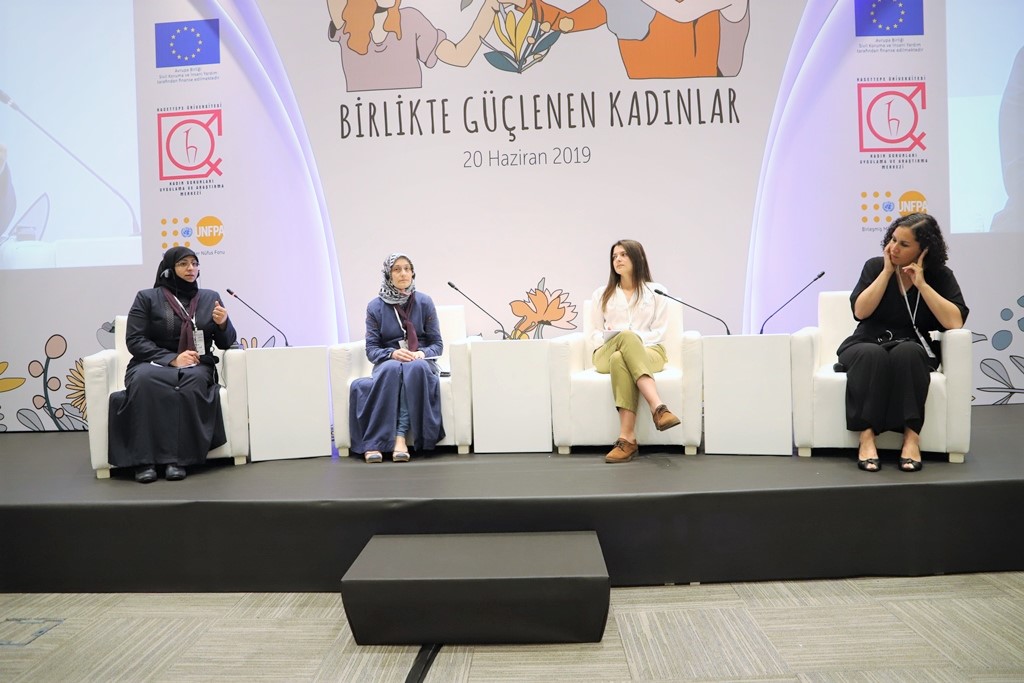
Kadın Sağlığı Danışma Merkezi’nde sağlık danışmanlığı hizmeti sunan, Iraklı doktor Seher Marwan, merkezde geçici koruma altındaki Suriyeli kadınlara verdiği hizmet tecrübesinin kendisi için yeni bir tecrübe olduğunu, daha önce ülkesini terk etmek zorunda kalan kadınlarla çalışmadığını paylaştı. Ancak, insani yardım çalışmalarının kendisini de olumlu yönde değiştirdiğini ekledi. Sağlık Aracısı S. M. A., başlarda kadınların merkeze gelmeye çekindiklerini söyledi ama zamanla güven duyup, sıklıkla merkezi kullandıklarını belirtti. Kız çocuklarının eğitimlerini tamamlaması, çocuk yaşta evlendirilmemesi konusunda farkındalığın arttığını söyledi. Merkezde sağlık aracısı olarak çalışan E. H., Halep’ten geldiğini, üç yıldan beri merkezde sağlık aracısı olarak hizmet verdiğini, ilk zamanlarda sağlık aracısı olarak kendi akraba ve tanıdıklarına bilgi verdiklerini, sonra yavaş yavaş daha geniş çevreye ulaştıklarını iletti. Merkezin sunduğu hizmetleri tanıtmanın yanı sıra, aynı zamanda çocuk yaşta evliliklerin zararları, gebelik öncesi ve doğum sonrası alınması gereken sağlık hizmetleri, şiddet ve haklar konusunda bilgilendirme yaptığını paylaştı. 2015 yılından beri sosyal hizmet uzmanı olarak görev yapan Tuğçe Uygun, hizmet verdiği kadınlarla birlikte dönüştüğünü ve güçlendiğini iletti. Dil engelini aşmak için, duyguların dilini anlamayı öğrendiğini söyleyen Tuğçe Uygun, merkezden hizmet alan kadınların hayatlarına tanık olmanın ağır sorumluluğunu hissettiğini ama aynı zamanda her hikayenin kendisini güçlendirdiğini söyledi.
“Birlikte Güçlenen Kadınlar” etkinliği, Kadın Sağlığı Danışma Merkezi’nde çalışan ve merkezin sunduğu hizmetlerden yararlanan kadınlardan oluşan koronun seslendirdiği şarkılarla son buldu.
